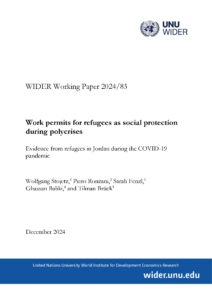This paper studies the social protection of refugees during a pandemic. A pandemic adds to the many existing challenges refugees face, creating a dangerous polycrisis.
Drawing on detailed household-level data collected by the United Nations High Commissioner for Refugees just before and during the COVID-19 pandemic, we analyse the economic impacts of granting work permits to Syrian and Iraqi refugees in Jordan.
Based on robust matching estimation, we show that during the pandemic, work permits strongly improved incomes, expenditures, and food security, and reduced child labour and engagement in risky jobs.
The strength of these work permit impacts is comparable to the impacts before the COVID-19 pandemic. Our findings thus demonstrate that granting access to formal employment is an effective tool for the social protection of refugees, including in times of polycrisis.
Restricting access to work permits—for example, by raising their price—does not appear to be a convincing strategy to achieve the social protection of refugees facing a polycrisis.
Publication Details
- Year of Publication: 2024
- Region/s: Middle East & North Africa
- Theme/s: Human Development · Individual Decision-making · Shocks & Livelihoods
- Research Topic/s: Health · Migration & Displacement
- DOI: https://doi.org/10.35188/UNU-WIDER/2024/546-2








